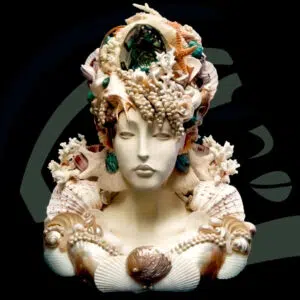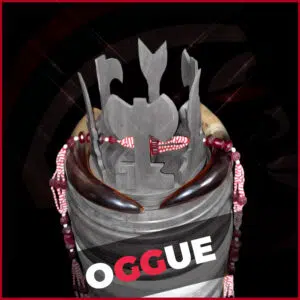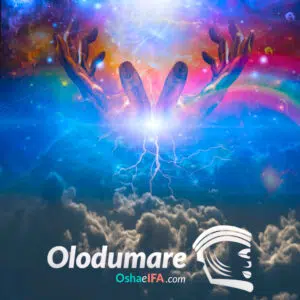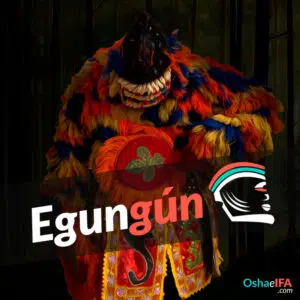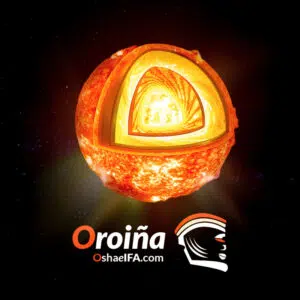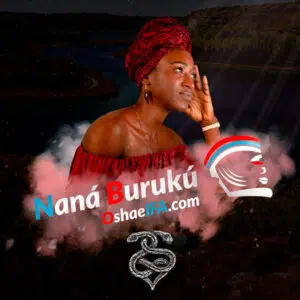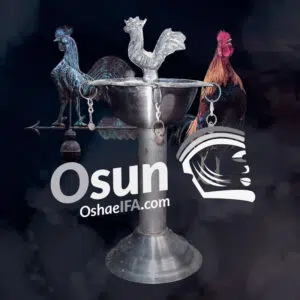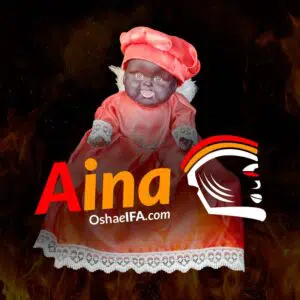Obara Koso

Obara Koso, is the combination between the major signs Obara and Iroso and corresponds to Odu number 111 in the lordly order of Ifa. orunmila advises that this person should give Twins gifts. Many balls of camwood is the sacrifice. This person's life will be pleasant and his plans will not be in vain. Ifá wants this person to be well.
Treaty of the sign of Ifa Obara Koso.
Other names for Obara Iroso:
- Obarak Koso.
- Obara Irosum.
In the odu Obara Koso is born:
- That the children of Azojuano (San Lázaro) wear a tiger crown.
- The crown of the deer (Agbani).
- The cashew.
- Here: Azojuano infected Dada Agbañi with leprosy and was thrown out of the Yoruba land.
- Azojuano's diseases were cured.
- Azojuano comes to fight with the people.
- It is the Ifá of the paluchero cashew.
What is the Obara Koso sign talking about?
- Talk about the king in need.
- It predicts that it is an Ifá of theft.
- Do not eat pigeon.
- For this Odu the Inshe-Osanyin is always lined with tiger skin.
- They bury witchcraft at the door of the house.
- Ifá sends you to move from where you live.
- All children who are born and see this Odu must be made Ebo so that they do not die.
- The protective dead are Aará.
- You cannot touch the branches of the sticks.
- The person is the daughter of two mothers.
Oddun Obara Koso (6-4) notes:
- The Awó must receive Kakuanardo quickly, to prosper.
- Azojuano cannot be received until the godfather dies.
- The person is lost for being disobedient, arrogant and talkative.
- There is talk of Abikú.
- Orúnmila declares the sacrifice to open the doors of prosperity.
- It must be sacrificed to avoid the loss of a child.
- An Odu-Ará is placed inside his Ifá.
- The herbs of Obara Koso are:: Bitter broom, cashew, milk grass, old woman's grass, cuaba, cimarrón tomato, curse remover (ewe ayo) and godmother vine.
- The different religious sects speak.
- It cannot have a Warlock garment, nor can it be registered at the foot of a garment.
It may interest you: Obara Meji, all about this Odu of Ifa
Recommendations of the Obara Koso sign (6-4):
When this Odu is seen to a person, they will be told that bad things have been buried in the door.
You should search the corners of your house and in the yard well, there is not a bad thing in them.
The person of this Odu "Obara Iroso 6-4" has good luck, but he has many bad eyes on him, so he does not advance. You will have to do Ebó.
In this Ifá you have to be careful with the Abikú, and take care of your children. Azojuano wishes to visit it.
When this Odu appears in IGBODU the person is told that he must make sacrifice to become immensely prosperous.
When this Odu Obara Koso appears in an ordinary record, the person must be advised that he must make sacrifice to avoid the loss of a child that he has borne of mature age.
Sayings of Obara Koso:
- Virtue there is one, evil there are many.
- If I do not have spiritual development, I will not prosper.
- If I don't want punishment, I won't have an abortion.
- My Crown is made of tiger skin.
- He who eats cashew, his mouth tightens.
- In order to steal, I must consult Ifá.
Obara Iroso bans:
This Odu predicts that the person is the daughter of two mothers. Talk about the King in need.
When this Odu comes out for a person and has received Azojuano, he is told that a dead person lives locked inside the Azojuano pot and can cause impotence and to counteract this situation, the person has to go to the mountains to look for a fallen log and sit on it and pray to the penis with what Orúnmila has sent.
This Ifá is about theft, where you are going to rob a place where there is a lot of money and to win you do
Ebored with: 3 roosters and 2 black hens. The first rooster is given to Eshu when Ebo is made, the second to Eshu when he is going to rob and the third to Eshu when he returns from the robbery. Then the two chickens will be given to Orúnmila.
Awó OBARA KOSO must receive kakuanardo quickly if it is to prosper. You should also put three cashew seeds in Eshu.
Tips from Oddun Obara Koso (6-4):
For this Ifá it is advisable to use leopard or tiger leather. You cannot eat pigeon.
For this Ifá, Azojuano cannot be received until his godfather dies, since the Yarará that Awó OBARA KOSO must have is inherited from the Godfather.
Here the Inshe-Osanyin are lined with tiger leather. Also in this Odu is born: That the children of AZOJUANO wear a tiger leather crown.
Description and meaning of the Odu Obara Koso
The Odu OBARA IROSO speaks of Ifa initiation to ensure blessings. The success of the person depends on his spiritual growth.
This was where Azojuano infected Dada Agbañi. For that reason they threw him out of the Yoruba land.
As also the diseases of Azojuano were cured.
Azojuano (San Lázaro) comes to fight with the people.
This Odu predicts that all children born this Year must be made Ebo, so that many of them do not die, even while they are in the womb, they will take their mothers.
In this Ifá the cashew was born. People wonder what mystery the cashew has that changes color from one day to the next, first it is green, then yellow and the next day red. And the seed is on the outside. In this oddun of Ifa the cashew was lost for being disobedient, arrogant, talkative and paluchero. Here the person has no faith and changes his mind from one day to the next and therefore always loses.
Here the protective Eguns of the person are Arara.
It is prohibited to work the rule of the Mayombe or Kimbisa, as well as to register in this religion.
Here the different religious sects speak. The Anai tree is the gallant at night.
Obara Iroso sign in Santeria:
In the Osha the Oddun Obara Koso under the divination system of the dilogun (snail), it is recognized as Obara tonti Iroso and its number 6-4.
Ifa code of ethics of the Odu Obara Iroso:
Kings need your advice too.
It may interest you: Treatise of the Iroso Gan sign
Says Ifa Obara Koso:
When this Oddun appears in IGBODU, the person is warned that a war is coming, and that he must give Eshu a goat to survive. It is forbidden to eat bitter leaves and any type of male bird including rooster and duck. In an ordinary record the person is told that he must serve Eshu and is prohibited from accompanying anyone on a journey. He must also offer a sacrifice to the divinity of water.
When Obara koso appears in IGBODU, the person must receive his Ogún and his Shango and also have a lightning stone on his Ifa altar.
In an ordinary registry, the person must be warned that he must receive Orúnmila and give a guinea to his head in order to prosper in life.
Prayer of the Odu Obara Iroso:
OBARA KOSO IFA HARD IFA NIRE IREKU KAFEREFUN ORUNMILA, ESHU ATI OGUN
Suyere Obara Koso:
OBASHE ONI SHANGO OMO ALARA OBA EKUN
Ebo by Obara Iroso 6-4:
Adimú Eguadalú: Salcochado corn and beans.
For friction: Scorpion grass, corojo butter and majá butter.
Ebbo for expiration in the oddun Obara Koso:
One guinea for OGUN, sea water, well water, rain water, river, lagoon, house, spring, aroma root, a line nail, pins, needles. Everything gets into the banana and is buried. Then take bramble-grill and grass of the blood.
Herbs (Ewe) of the Odu Obara Iroso:
Alacrancillo, cashew, atiponlá, ceiba, carob, paradise, holy basil.
Pataki of the sign Obara Koso (Iroso):
Divination was made for the mother who had two daughters.
A woman had two daughters who always went to war as soldiers. Before going to war, the eldest daughter placed an egg on top of a stone, while the younger daughter placed her egg on top of a pumpkin on a plate. They left instructions to their mother that if the eggs fell to the ground it would mean that they had been killed in battle.
On one occasion before going to the battle of Oshen, they went by divination and were told to give ESHU a goat before leaving. They only gave the skeletons of the goat and the chickens to ESHU, promising to give him a live goat if they returned saved from the war. Long after they had left for the war, his mother saw that one morning the two eggs had fallen to the ground and broken. Their opponents had given them rooster and bitter leaves that they had
prohibited, thereby neutralizing their powers. Looking at the positions of the eggs, the mother concluded that the war had ended with her two daughters. She reacted by running towards the Aiye River and collected her sand. Traditionally, nobody looked at the sand of that river because whoever did it would die immediately. She stirred up the sand and scooped it up, covered it with a plate, and left for the battlefront at Oshen.
Arriving in Oshen, he began to inquire about two young girls who were participating in the battle for the town. They told him that their destinations had been forgotten because they had long ago died on the altars of Ogún and Ojá. With this bad news, she uncovered the sand plate and everyone who looked at her fell dead. She killed many people in the village, before reaching the palace of the King of Oshen, who ran from his throne. She chased after him and when she was about to reach him he became a hill and the woman became a beehive forever.
around the hill.
Obara Koso Ifa Traditional Nigerian:
ÒBÀRÀ ÌROÙN
Òbàrà kosùn sápá
Òbàrà kosùn sesè
Òbàrà kósùn sápá kosùn sésè kóo dá ribiribi ojú yes
A day fún Eyelé
Èyí tí n fomi ojúú sògbérè omo
Wón ní kó rbo
Ayé ye òun báyìí?
Eyelé bá rbo
Ní bá n bímo méjì méjì
Okan Ako
Okan Abo
Ayé ye Eyelé
Ní wá n jó n ní wá n yò
Ní n yin àwon Babaláwo
Àwon Babaláwo n yin Ifá
Ó ní béè làwon Babaláwo tòún wí
Òbàrà kosùn sápá
Òbàrà kosùn sesè
Òbàrà kósùn sápá kosùn sésè kóo dá ribiribi ojú yes
A day fún Eyelé
Èyí tí n fomi ojúú sògbérè omo
Wón ní ó saca káalè
Ebo did not know
Eyelé gbébo nbè
Ó rubo
Èyin ò mò pé méjì lEyelé n bí?
Eyelé won è bikan.
Ifá advises that this person should give gifts to Twins. Many balls of camwood is the sacrifice. This person's life will be pleasant and his plans will not be in vain. Ifá wants this person to be well.
Òbàrà rubs osùn on his arms
Òbàrà rubs osùn on her legs
Òbàrà rubs osùn on the arms and legs without affecting the eyes
They made divination for the Palomo
He who cried because he had no children
They advised him to offer sacrifice
He asked, "Would life please me?"
The Palomo offered the sacrifice
And started having twins
One would be male
And the other female
Life pleased the Palomo
He began to dance and rejoice
He praised his Babaláwos
Their Babaláwos praised Ifá
He said it was exactly as his Babaláwos had said
Òbàrà rubs osùn on his arms
Òbàrà rubs osùn on her legs
Òbàrà rubs osùn on the arms and legs without affecting the eyes
They made divination for the Palomo
He who cried because he had no children
He was advised to take care of the earth
And offer sacrifice
El Palomo heard about the sacrifice
And he did
Did you not know that the Dove incubates two children at the same time?
La Paloma does not incubate an egg.
It may interest you: Ifa Iroso Umbo sign
Eshu of the sign Obara Iroso:
ESHU AFRA
This Eshu works with air, carries a doll, a pot and 24 snails.
The first thing to do is to prepare the clay pot, and for this this pot is taken with: water, jutía and smoked fish, corojo butter, toasted corn, honey, brandy, dry wine, guinea pepper, jio-jio, dove, eru, obi, kolá, osun naború, orogbo, coconut, candles. For a crab cave, there you take some Ilekán (cave soil) and pour it into the clay pot. He is given Obi Omi Tutu and given the hee-hee, which is quartered into four pieces and
gets into the mud. After it is seasoned with all the ingredients mentioned above, the
24 snails. It is smoked with ashé, two candles are lit and kneeling it is sung:
"AFRA BAE OTO ERO SONOBA".
After it is brought home, it is cemented and planted.
The doll has two faces. This is loaded by the head with: mowo, get up, pica pica, eru, obi, kolá, osun naború, orogbo, toasted corn, honey, brandy, dry wine, Iyefá, corojo butter, land of a hill, river sand and sea, gold, silver, ivory, coral and jet, head of a ringworm, quail, rooster, parrot feather, 3 needles and a stone from the entrance of the city.
When he eats, a casserole painted outside black is prepared for him.
To this is added, of all the ingredients, mentioned above, except the land of crab (ilekan). In addition, water is poured from the lagoon. At night this casserole is put on the sidewalk and ESHU is put on another new casserole, to do the ceremony again. In the casserole, put three Ekó, bread, smoked jutía, corojo butter, dry wine, and cover well.
This casserole represents the life of Eshu Afra.

